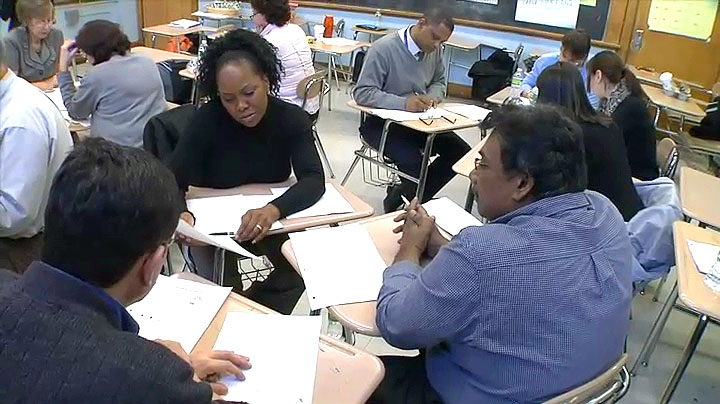
Goals
This tool stimulates and supports discussion on the characteristics, strength and weaknesses of different models for professional development.
Users
System leadership and professional development providers in mathematics. It will also be useful for lead-teachers in mathematics.
Introduction
Everybody understands that the performance of any school system is largely determined by what happens in classrooms, with the professional skills of the teacher as a key determinant – and limitation – in what students achieve. International standards, as set out in the Common Core and related State Standards, have raised the bar for teaching as well as learning. Students can no longer get by with a procedural fluency alone; they need to acquire the expertise, described by mathematical practices, that makes their skills usable for reasoning and solving problems. These cannot be taught by traditional imitative approaches; to help students develop the necessary mathematical autonomy, teachers must enlarge their range of teaching strategies and tactics, in a way summarized as "adaptive expertise". For most teachers, climbing the pathway of professional learning towards this level of expertise requires ongoing support.
Thus a principal goal of professional development is to enable teachers to acquire "adaptive expertise", and deploy it in their classrooms. Though most professional development programs are successful, they are usually evaluated in less costly ways than through observed changes in classroom practice – the most important criterion and the research base used here.
This workshop invites teacher-leaders to think about the purpose of PD, the characteristics of effective PD, and the different models of PD that are commonly used: Training models; Coaching models; Workshop models and Professional Learning Communities. For each model some examples are explored.
Such models should not be considered as in competition with one another. Indeed they all have their advantages and disadvantages. A training model in which teachers are given an opportunity to listen to an expert may be useful in learning about a new initiative but is unlikely to lead to profound changes in classroom practice. Coaching models can be very effective, but this approach is very expensive. Courses in which a group of teachers work together can be effective if they contain opportunities to plan, to enact, to observe and reflect on new approaches. The most powerful methods in the long term involve the teachers themselves forming professional learning communities that can sustain them day-by-day.
One such model is introduced in more detail in a related tool: Lesson Study for Professional Development.
Session Outline
- What are your priorities for professional development in mathematics?
- What is the purpose of PD in mathematics?
- What are the characteristics of effective PD?
- What effective models for PD are there?
- What are the strengths and weaknesses of the different models of effective PD?
Videos
The Presentation Slides contain an embedded video that may not play in older versions of Powerpoint. You can view the video online here:
Divergent Questioning in 8th Grade Math
This is a short extract from the video ‘Divergent Questioning in 8th Grade Math’ from TeachingChannel.